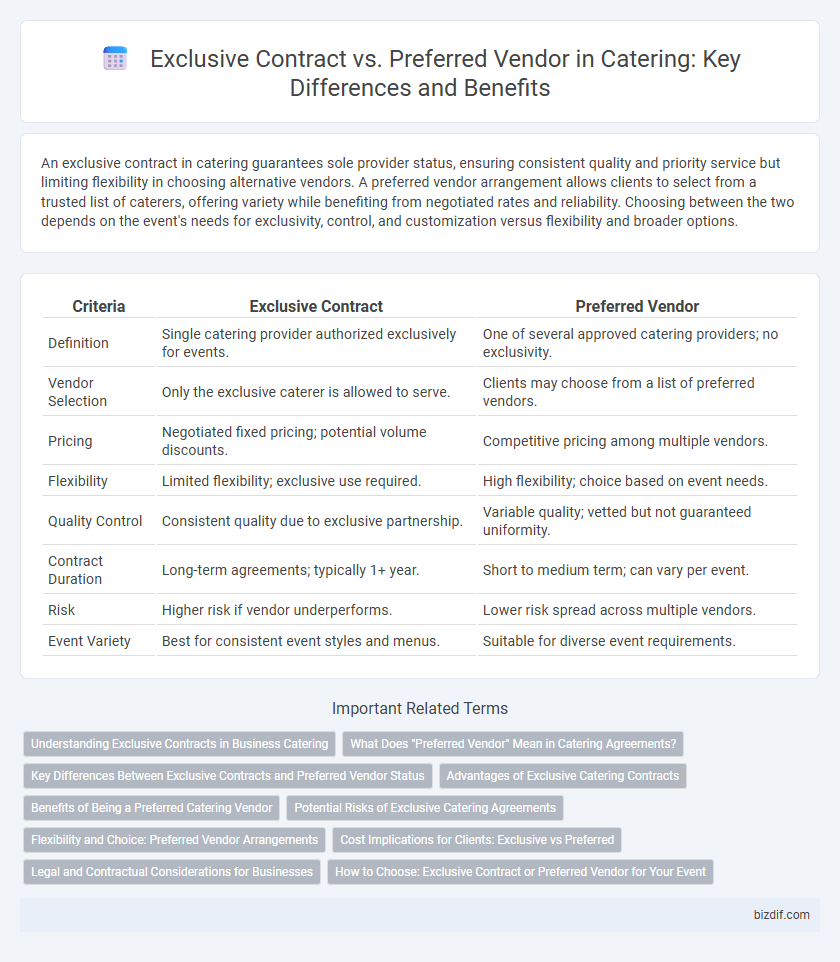An exclusive contract in catering guarantees sole provider status, ensuring consistent quality and priority service but limiting flexibility in choosing alternative vendors. A preferred vendor arrangement allows clients to select from a trusted list of caterers, offering variety while benefiting from negotiated rates and reliability. Choosing between the two depends on the event's needs for exclusivity, control, and customization versus flexibility and broader options.
Table of Comparison
| Criteria | Exclusive Contract | Preferred Vendor |
|---|---|---|
| Definition | Single catering provider authorized exclusively for events. | One of several approved catering providers; no exclusivity. |
| Vendor Selection | Only the exclusive caterer is allowed to serve. | Clients may choose from a list of preferred vendors. |
| Pricing | Negotiated fixed pricing; potential volume discounts. | Competitive pricing among multiple vendors. |
| Flexibility | Limited flexibility; exclusive use required. | High flexibility; choice based on event needs. |
| Quality Control | Consistent quality due to exclusive partnership. | Variable quality; vetted but not guaranteed uniformity. |
| Contract Duration | Long-term agreements; typically 1+ year. | Short to medium term; can vary per event. |
| Risk | Higher risk if vendor underperforms. | Lower risk spread across multiple vendors. |
| Event Variety | Best for consistent event styles and menus. | Suitable for diverse event requirements. |
Understanding Exclusive Contracts in Business Catering
Exclusive contracts in business catering grant a single vendor sole rights to provide food services, ensuring consistent quality and streamlined communication. This arrangement often includes negotiated pricing, guaranteed volume, and tailored menu options that align with corporate needs. Understanding these contracts helps businesses secure reliable service while balancing cost-efficiency and brand standards.
What Does "Preferred Vendor" Mean in Catering Agreements?
A "Preferred Vendor" in catering agreements refers to a supplier or service provider selected by an event venue or organizer due to their proven quality, reliability, and competitive pricing, but clients retain the freedom to choose other vendors if desired. This designation often results from a vetting process, ensuring trusted vendors meet specific standards without restricting client options. Preferred vendor status fosters strong partnerships and can offer benefits like priority service and negotiated discounts, enhancing the overall event catering experience.
Key Differences Between Exclusive Contracts and Preferred Vendor Status
Exclusive contracts in catering guarantee a single vendor manages all food services for an event or venue, ensuring consistency and dedicated attention, with restrictions on competing suppliers. Preferred vendor status permits multiple approved caterers to offer services, providing clients with more options while vendors enjoy prioritized consideration. These key differences influence vendor relationships, client choice flexibility, and contractual obligations within catering arrangements.
Advantages of Exclusive Catering Contracts
Exclusive catering contracts guarantee consistent service quality by partnering with a single provider, ensuring seamless event coordination and menu customization tailored to client needs. These contracts often secure better pricing through volume commitments, reducing overall catering costs and increasing budget predictability. Exclusivity fosters stronger vendor-client relationships, enhancing reliability, responsiveness, and the ability to innovate event experiences.
Benefits of Being a Preferred Catering Vendor
Being a preferred catering vendor offers increased visibility and consistent business opportunities through established client relationships and prioritized placement in vendor directories. This status fosters trust and reliability, making it easier to secure repeat contracts and access exclusive event opportunities without the restrictions of an exclusive contract. Preferred vendors benefit from flexible agreements that allow collaboration with multiple clients while maintaining competitive advantages in pricing and service customization.
Potential Risks of Exclusive Catering Agreements
Exclusive catering contracts can limit a business's flexibility by restricting it to a single vendor, potentially leading to higher costs and reduced service quality if the caterer underperforms. Dependency on one provider increases vulnerability to supply chain disruptions and limits the opportunity to negotiate better terms with other vendors. Businesses may also face challenges in adapting to changing customer preferences or event needs due to the constraints imposed by exclusive agreements.
Flexibility and Choice: Preferred Vendor Arrangements
Preferred vendor arrangements offer greater flexibility and choice compared to exclusive contracts by allowing clients to select from multiple vendors based on event-specific needs and preferences. This approach accommodates changing requirements, budget variations, and diverse culinary styles, enhancing customization and satisfaction. Catering businesses benefit by maintaining broader market access and fostering competitive innovation through non-exclusive partnerships.
Cost Implications for Clients: Exclusive vs Preferred
Exclusive catering contracts often lead to lower overall costs for clients by locking in fixed pricing and securing volume discounts, reducing price variability. Preferred vendor arrangements may result in higher expenses due to less committed volume and potential for price negotiations on each event. Clients should weigh the guaranteed savings of exclusivity against the flexibility but possible premium costs of preferred vendor status.
Legal and Contractual Considerations for Businesses
Exclusive contracts in catering legally bind a business to use only one vendor, restricting the ability to source alternative providers and requiring thorough contract review to understand termination clauses and liability. Preferred vendor agreements offer more flexibility by establishing a preferred status without exclusivity, often including negotiated rates and service guarantees but allowing businesses to engage other caterers. Understanding the legal obligations, such as indemnity provisions and dispute resolution mechanisms, is crucial for businesses to mitigate risks in both exclusive and preferred vendor contracts.
How to Choose: Exclusive Contract or Preferred Vendor for Your Event
Choosing between an exclusive contract and a preferred vendor for your event hinges on budget flexibility and control over catering options. An exclusive contract guarantees a single caterer, often ensuring consistent quality and streamlined communication, ideal for large-scale or highly curated events. Opting for a preferred vendor allows greater variety and pricing competition, suited for smaller or more diverse events with flexible catering needs.
Exclusive contract vs Preferred vendor Infographic

 bizdif.com
bizdif.com